Renfe Operadora
Renfe Operadora (Spanish pronunciation: [ˈreɱfe opeɾaˈðoɾa]) is the state-owned company which operates freight and passenger trains on the 1,668 mm (5 ft 5 21⁄32 in) Iberian gauge, the 1,435 mm (4 ft 8 1⁄2 in) standard gauge and the 1,000 mm (3 ft 3 3⁄8 in) metre gauge networks of the Spanish national railway infrastructure company Adif (Administrador de Infraestructuras Ferroviarias—Railway Infrastructure Administration).
 | |
| Type | State-owned enterprise |
|---|---|
| Industry | Rail transport |
| Founded | 24 January 1941 |
| Headquarters | , Spain |
Key people | Julio Gómez-Pomar Rodríguez (CEO), Enrique Peña Pérez, Manuel Fresno Castro, José Luis Marroquín |
| Products | Rail transport, Freight |
| Revenue | |
| Owner | Government of Spain (100%) |
Number of employees | |
| Subsidiaries | Renfe Cercancías |
| Website | renfe |
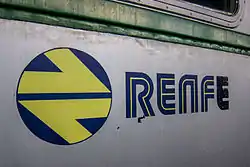

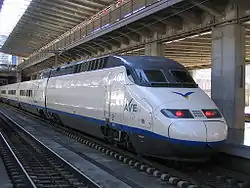

History
The name "Renfe" is derived from that of the former Spanish National Railway Network, RENFE (acronym of Red Nacional de los Ferrocarriles Españoles—National Network of Spanish Railways) created on 24 January 1941 with the nationalisation of Spain's railways. As per EU Directive 91/440, RENFE was divided into Renfe-Operadora (operations) and ADIF (infrastructure) on 1 January 2005. At the same time, the existing RENFE double-arrowed logo (nicknamed the "galleta", Spanish for biscuit), first introduced in 1971 and given a facelift in 1983, with a sans-serif font, and again in 2000, with a mixed-case italic font, has been replaced by a dark purple lower-case wordmark designed by Interbrand, and also replaces some of the separate logos used by the other sectors, although the old RENFE logo remains in use in some stations in Spain and on maps to indicate an ADIF station.
The Railway Sector Act, 2003 separated the management, maintenance and construction of rail infrastructure from train operation. The first activity is now the responsibility of Administrador de Infraestructuras Ferroviarias (ADIF), the legal successor of RENFE, while the newly created Renfe-Operadora (commercial name "Renfe Operadora" or simply "Renfe") owns the rolling stock and remains responsible for the planning, marketing and operation of passenger and freight services (though no longer with a legal monopoly).[3]
Renfe Operadora inherited the management model of the business units of the old RENFE, which made Renfe Operadora responsible for the operation of the following passenger and freight services. In January 2006, Renfe Operadora restructured the main business units into four:
- Dirección General de Servicios Públicos de Cercanías y Media Distancia (General Public Utilities Directorate for Suburban and Medium Distance): responsible for commuter services (Cercanías), medium-distance high-speed rail AVE services and medium-range regional services (es:Regionales and es:Media Distancia). However, control of some Cercanías services were transferred to Spain's Autonomous communities.
- Dirección General de Servicios de Larga Distancia (General Directorate of Long Distance Services): responsible for long-distance intercity and high-speed rail services (except medium-distance AVE services and Media Distancia, which is managed by the above business unit).
- Dirección General de Servicios de Mercancías y Logística (General Directorate for Freight and Logistics Services): responsible for freight services.
- Dirección General de Fabricación y Mantenimiento (General Directorate of Manufacturing and Maintenance): responsible for rolling stock maintenance and manufacture (also known as Integria)
The Spanish state railways are currently engaged in a transformation and modernisation project. Key to this effort is a major overhaul of their out-dated ICT (information and communication technology) systems through an ICT renewal project scheduled for completion at the end of 2010 under the responsibility of Corporate Director of Information Systems Óscar Gómez Barbero. So far, the company has introduced improvements to their internet ticket sales and adopted new ICT management practices within a "more industrial" organisational model, though Mr. Gomez has publicly acknowledged the difficulties in transforming what still remains a very hierarchical organisation.
Structure
In June 2013, Renfe's board agreed to restructure the organisation into four separate companies, responsible for:
- Operating passenger trains;
- Freight;
- Rolling stock maintenance;
- Train leasing
These four would be underneath a single holding company.[4][5]
Figures
| Figures[6] | 2006 | 2007 | 2008 | 2009 | 2010 | 2011 | 2012 | 2013 | 2014 | 2015 | 2016 | 2017 | 2018 | 2019 |
|---|---|---|---|---|---|---|---|---|---|---|---|---|---|---|
| Passengers (Mio.)[7] | 527.975 | 517.583 | 510.176 | 476.334 | 463.012 | 476.917 | 472.145 | 466.057 | 464.961 | 465.201 | 471.359 | 487.881 | 507.088 | 510.453 |
| Passenger-kilometer (Mio.) | 20.480 | 20.167 | 22.281 | 21.895 | 21.166 | 21.585 | 21.319 | 22.563 | 23.754 | 24.825 | 25.291 | 26.060 | 26.931 | 27.263 |
| AVE Passengers (Tsd.) | 4.878 | 5.559 | 11.461 | 11.250 | 10.851 | 12.563 | 12.101 | 14.697 | 17.967 | 19.428 | 20.352 | 21.108 | 21.332 | 22.370 |
| AVE Passenger-kilometer (Tsd.) | 1.884 | 2.161 | 4.888 | 5.260 | 5.171 | 5.846 | 5.793 | 7.095 | 8.038 | 9.230 | 9.632 | 10.267 | 10.289 | 10.760 |
Operations


The company operates some 12,000 km (7,500 mi) of railways, 7,000 km (4,300 mi) of them electrified. Most of the tracks are constructed to the broad "Iberian gauge" of 1,668 mm (5 ft 5 21⁄32 in), the same as that used in Portugal but wider than the international gauge of 1,435 mm (4 ft 8 1⁄2 in) which is standard in neighbouring France, most of western and central Europe, and most of the rest of the world. The newer high-speed (AVE) network has been built to the international standard gauge of 1,435 mm for the connection to the rest of the European railway system. For this reason, the 1,435 mm gauge is generally termed "European gauge" in Spain.
The Spanish high-speed system is called AVE (Alta Velocidad Española, meaning "Spanish High Speed"). The logo incorporates a feature which resembles a bird (ave in Spanish). The high-speed lines are built to the standard European gauge (1,435 mm or 4 ft 8 1⁄2 in).
Construction of the high-speed rail line between Madrid and Seville began in 1988 and operation commenced in 1991. Train speed on the Seville line is 300 km/h (190 mph). The second high-speed rail line (Madrid to Barcelona) was completed in 2007 with the inaugural service commencing at 06:00 on 20 February 2008. The operational speed on this route is 350 km/h (220 mph). The greater part of the line (Madrid to Lleida) was placed into service on 11 October 2003, with connection to Huesca from Zaragoza. The third high-speed line (Madrid to Toledo) was opened in November 2005, followed by the spur from Córdoba to Málaga as far as Antequera in 2007. Another high-speed route from Madrid to Valladolid was opened in 2007, the line from Madrid to Valencia was opened in 2010 and the first stage of the high-speed line in Galicia opened in 2011. A line to Lisbon is being designed.
Other lines operated by Renfe include Euromed, a moderate-speed line between Barcelona and Alicante.
In addition to intercity transport, Renfe operates commuter train systems, known as Cercanías (or Rodalies in Catalonia and Cercanías-Aldirikoak in the Basque Country), in eleven metropolitan areas, including Madrid and Barcelona. In some cities, Renfe shares the market with other commuter railway operators, such as FGC in Barcelona.
Passenger rolling stock
Renfe Operadora utilises the following rolling stock and commercial products inside of its two divisions:
Suburban and Medium Distance (DGSPCMD)

Cercanías (commuter rail)
| Rolling stock | Metropolitan area | Image |
|---|---|---|
| RENFE Class 442 EMU | Madrid |  |
| RENFE Class 446 EMU | Bilbao Madrid San Sebastián | .jpg.webp) |
| RENFE Class 447 EMU | Barcelona Madrid Valencia Murcia/Alicante |
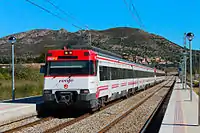 |
| RENFE Class 450/451 EMU | Barcelona Madrid |  |
| Civia EMU | Asturias Barcelona Cádiz Madrid Málaga Sevilla Valencia Zaragoza |  |
| RENFE Class 592 DMU | Valencia Murcia/Alicante |  |
.jpg.webp)



Medium Distance
| Rolling stock | Route(s) | Image |
|---|---|---|
| RENFE Class 440/470 EMU (to be phased out) | Córdoba – Rabanales León – Ponferrada – Vigo León – Gijón Valladolid – Santander Valladolid – Ávila Valladolid – León Valencia − Barcelona Valencia − Alicante |  |
| RENFE Class 447 EMU | Barcelona |  |
| RENFE Class 448 EMU | Catalunya Aragón |  |
| RENFE Class 449 EMU | Madrid – Jaén León – Ponferrada – Orense – Vigo Sevilla – Cádiz Barcelona – Girona – Figueres – Portbou Huelva – Sevilla Jaén – Córdoba – Sevilla – Cadiz Madrid − Alcázar de San Juan − Albacete Madrid − Alcázar de San Juan − Ciudad Real Alicante – Albacete – Ciudad Real Madrid − León Madrid – Vitoria Vitoria – Irun Córdoba – Bobadilla Barcelona – Reus Barcelona – Tortosa | 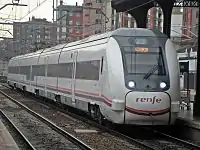 |
| RENFE Class 592 DMU (to be phased out) | Madrid – Cuenca – Valencia Madrid – Talavera Murcia – Cartagena Valencia − Alcoi CELTA: Oporto - Vigo (Service CP) |  |
| RENFE Class 594 DMU | Valladolid – Zamora – Puebla de Sanabria A Coruña – Ferrol A Coruña – Lugo – Monforte de Lemos - Ourense Madrid – Soria Murcia – Cartagena |  |
| RENFE Class 596 DMU | Murcia – Cartagena Orense – Monforte de Lemos Zaragoza – Canfranc Vigo - Valença |  |
| RENFE Class 598 DMU | Madrid – Badajoz Huelva – Zafra Sevilla – Mérida | 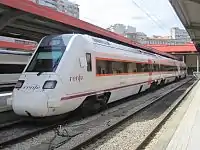 |
| RENFE Class 599 DMU | A Coruña – Vigo Guixar Salamanca – Ávila – Madrid Zaragoza – Salamanca Salamanca – Palencia Valencia – Cartagena Zaragoza – Valencia Zaragoza – Cartagena Sevilla – Málaga Sevilla – Almería Granada – Algeciras Málaga – Ronda Granada – Linares Madrid − Águilas |  |
| RENFE Class 104 EMU (High-speed) | Madrid – Toledo Madrid – Ciudad Real Sevilla – Córdoba Barcelona – Camp De Tarragona Zaragoza – Calatayud | 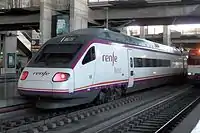 |
| RENFE Class 114 EMU (High-speed) | Madrid – Valladolid Barcelona – Lleida |  |
| RENFE Class 121 EMU (High-speed) | Cádiz – Jaén A Coruña – Ourense A Coruña – Vigo Urzaiz Madrid – Ponferrada Ponferrada-Vigo Madrid – Gandia Madrid-Salamanca | 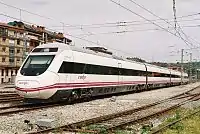 |
Long Distance (DGSLD)
| Service | Rolling stock | Route(s) | Image |
|---|---|---|---|
| Altaria | RENFE Class 334 locomotive + Talgo IV cars | Madrid – Algeciras Madrid – Granada Madrid – Murcia – Cartagena |  |
| Talgo | RENFE Class 252/334 locomotive + Talgo VI cars | Madrid – Almería Barcelona – Murcia – Cartagena/Lorca Torre del Oro: Barcelona – Valencia – Sevilla |  |
| Intercity (Talgo) | Renfe Class 252 locomotive + Talgo VI cars | Madrid – Valencia |  |
| Intercity (Arco) | Renfe Class 334/252 locomotive and Series 2000 cars (Arco) | A Coruña - Hendaye Vigo - Bilbao | |
| Trenhotel (sleeper service) | RENFE Class 252/334 locomotive + Talgo sleeper cars | Galicia: Barcelona – A Coruña Barcelona – Vigo Rías Gallegas: Madrid – Pontevedra Atlántico: Madrid – A Coruña - Ferrol Lusitania: Madrid – Lisbon Surexpreso: Hendaye – Lisbon |  |
| Service | Rolling stock | Route(s) | Image |
|---|---|---|---|
| AVE | RENFE Class 100 EMU | Madrid – Sevilla Madrid – Alicante Madrid – Marseille Barcelona – Toulouse Barcelona – Lyon |  |
| RENFE Class 102 EMU | Madrid – Huesca Madrid – Zaragoza Madrid – Valladolid Madrid – Málaga Valencia – Sevilla |  | |
| RENFE Class 103 EMU | Madrid – Barcelona Madrid – Málaga |  | |
| RENFE Class 112 EMU | Madrid – Cuenca – Valencia Madrid – Cuenca – Albacete Madrid – León Barcelona – Málaga Barcelona – Zaragoza Barcelona – Sevilla |  | |
| Alvia (mixed high-speed & conventional service) | RENFE Class 120/121 EMU | Madrid – Pamplona Madrid – Logroño Madrid – Irún/Hendaya Madrid – Bilbao Barcelona – Irún Barcelona – Bilbao Barcelona – Pamplona Barcelona – Valladolid |  |
| RENFE Class 130 EMU | Madrid – Gijón Madrid – Santander Alicante – Gijón Alicante – Santander Madrid – Cádiz Madrid – Huelva Madrid – Valencia – Castellón Madrid – Valencia – Gandía Barcelona – A Coruña Barcelona – Vigo Barcelona – Gijón |
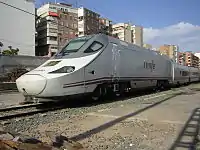 | |
| RENFE Class 730 HMU | Alicante – Madrid – Pontevedra Alicante – Madrid – A Coruña Madrid – Ferrol Madrid – Pontevedra Madrid – Ponferrada Madrid-Murcia |
 | |
| AVE City | RENFE Class 104 EMU RENFE Class 121 EMU | Valencia – Málaga Madrid – Sevilla Madrid – León | 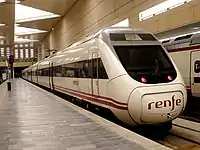 |
| Euromed (medium-high-speed service) | RENFE Class 130 EMU | Barcelona – Valencia – Alicante |  |
Class numbers
All classes are designated by three numbers. The first digit has a special meaning:
- 1xx: High speed multiple unit
- 2xx: Electric locomotive
- 3xx: Diesel locomotive
- 4xx: Electric multiple unit (EMU)
- 5xx: Diesel multiple unit (DMU)
- 6xx: Hybrid locomotive
- 7xx: Hybrid multiple unit (HMU)
- 8xx: Trams which can run on railways
Notes
References
- "Renfe cerró 2018 con un beneficio de 111 millones de euros" [Renfe closed 2018 with a profit of 111 million euros]. Rail Press News (in Spanish). 7 April 2019. Retrieved 18 February 2020.
- "Renfe presenta otro plan de bajas voluntarias para 2018 de hasta 805 trabajadores" [Renfe presents another voluntary leave plan for 2018 of up to 805 workers]. ABC (in Spanish). Madrid. 20 January 2018. Retrieved 18 February 2020.
- "La Nueva Renfe" [The New Renfe]. Federación Castellano Manchega de Amigos del Ferrocarril (in Spanish). 11 January 2005.
- "RENFE restructuring approved". Railway Gazette International. Retrieved 1 July 2013.
- Puente, Fernando. "Renfe confirms four subsidiary split". International Railway Journal. 2 July 2013. Retrieved 4 July 2013.
- "Railway Gazette". Retrieved 11 June 2020.
- Railway Gazette. "Railway Gazette".
External links
| Wikimedia Commons has media related to Renfe Operadora. |

